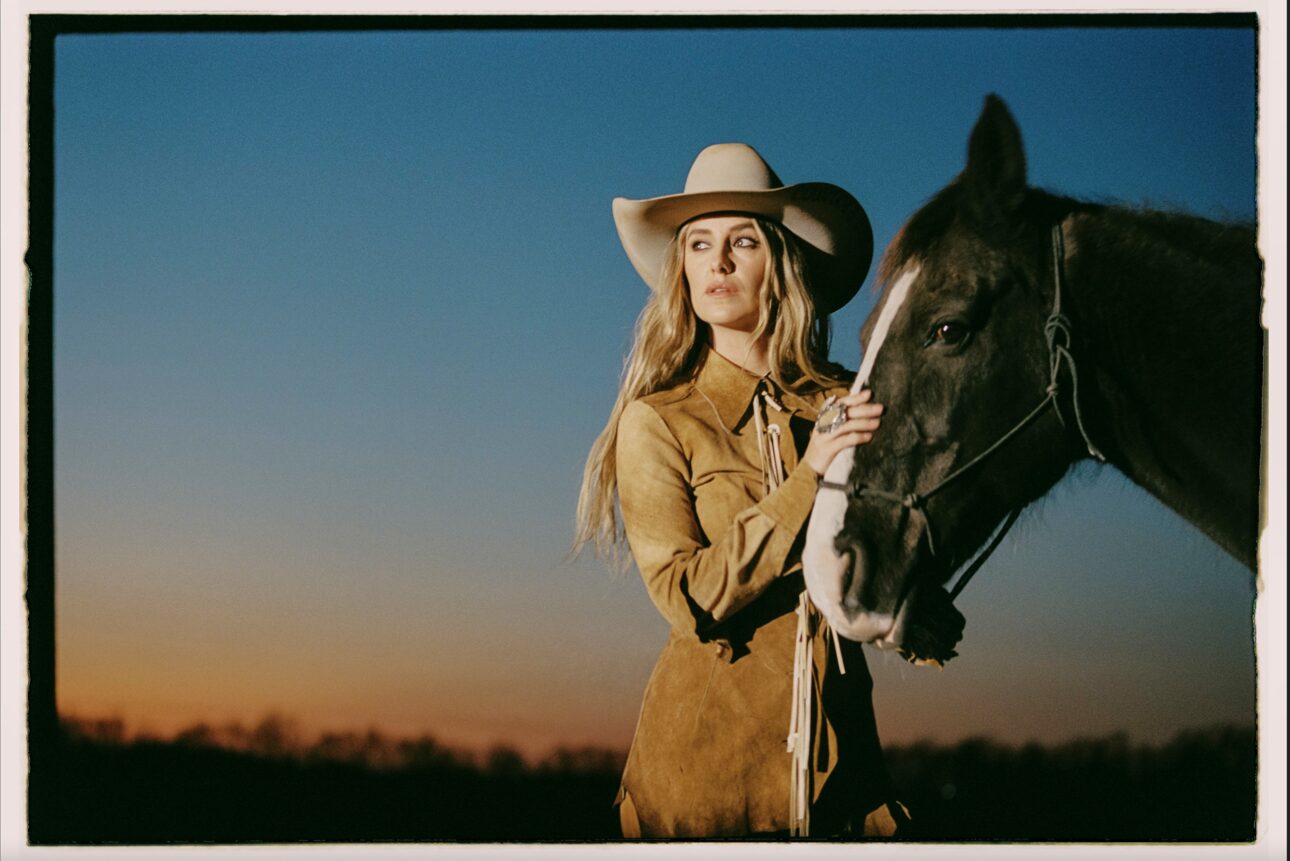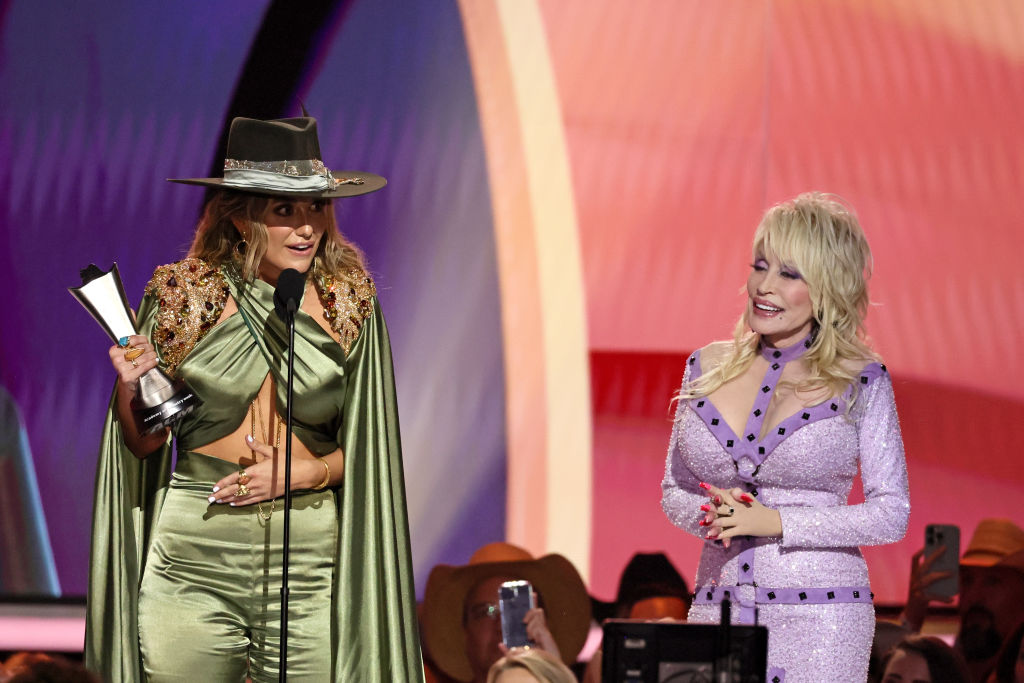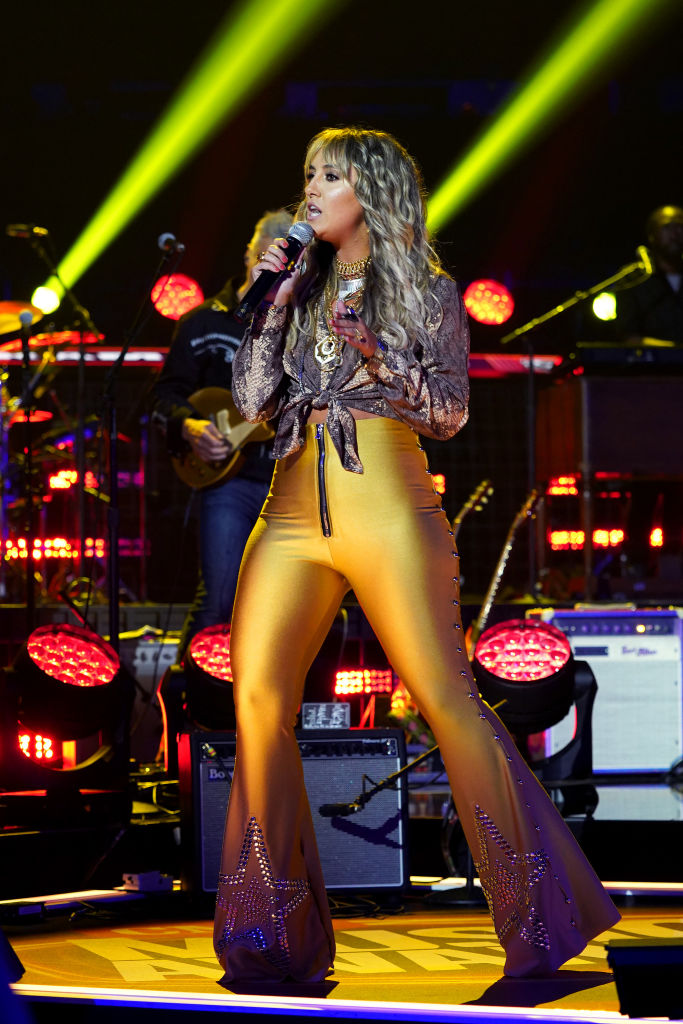COUNTRY GIRL: Lainey Wilson

Lainey Wilson misses her horse.
Back home in Baskin, Louisiana, she keeps a brown quarter horse on the family farm, Tex, and he’s one of her oldest and dearest friends.
“He’s been such a good horse,” she says from a tour bus hurtling down a highway in New Jersey, her accent thick as the proverbial molasses. “I got him when I was nine. That was the year I wrote my first song, got my first pair of bell-bottoms, and went to Nashville for the first time. Tex has been through it all with me.”
She’d love nothing more than to bring him to Nashville with her, but Lainey’s on the road more than she’s not, and when she does have a few days at home, her life is full of what she calls the “good chaos” of country success.
It’s exciting, affirming, occasionally overwhelming—and not conducive to keeping a 30-year-old horse. “He’s getting up there in years, so I hate to uproot him. I had to decide to let him stay home, but I think I might’ve had my last ride on him the last time I was down there.”
Lainey is a fast-talker—“I’m wired to go, go, go”—but she grows quiet for a moment. At the height of her success, with a few singles on the country chart and a sharp new album on the way, she’s looking for people and creatures and habits and really anything that might keep her grounded in her own life.
Her sharp, soulful new album is called Whirlwind, and it’s not going to make her life easier. She’s searching for quiet spaces away from the tour bus and the stage and the 12-hour meet-and-greet she recently completed in Nashville. Tex is one of those anchors, a connection to her days competing in kids’ rodeos. “I grew up rodeoing. Me and my sister were PRCA flag girls. We’d come out with the flags, and then I’d sing the national anthem. I used to barrel race, but my sister would beat me every time. I’m still mad about that.”
With her songs about cowboys and wild horses and especially her appearance on the TV show Yellowstone, Lainey is churning up new interest in what she calls the “Western way of life”—that place where cowboy culture overlaps with country music. “I noticed that people got obsessed with Yellowstone and started buying horses and wearing cowboys hats. It’s cool to see people doing the things I grew up doing. If it makes you feel at home, why the hell not?”

In the past few years Lainey has emerged as one of the biggest—and one of the unlikeliest—stars out of Nashville, a self-proclaimed hippie cowgirl whose vision of country is expansive and welcoming. On hits like “Things a Man Oughta Know,” “Watermelon Moonshine,” and “Country’s Cool Again,” she has refined a wild, crunchy mix of traditional twang, heavy classic rock, hip-hop, and ‘90s alternative rock.
She calls it “bell-bottom country,” after her throwback fashion signature: It can be as broad as her flared pants, a haven for oddballs and misfits and cowboys alike. Unlike some of her peers, she’s not a gatekeeper with rigid restrictions on who is and who cannot be country. Taking a lesson from her hero Dolly Parton—who inspired Lainey’s hit “WWDD” (“What Would Dolly Do”)—Lainey doesn’t make that inclusivity sound like a political statement or a marketing strategy. She just throws a party and invites everyone. “I want everybody to feel welcome no matter where you come from, no matter what your life is. That’s the power of country music right there.”
Bell-bottom country is stirring up some good chaos in Nashville, upsetting the natural order of things and bringing some fresh ideas to the charts. Rather than buff out her jagged edges, the industry has embraced her. In November she won the Country Music Association award for Entertainer of the Year, and in May she won the same award from the Academy of Country Music.
“I’ve been in Nashville for 13 years, and the first 10, nothing happened. It’s only in the last three years that I feel like the needle started to move.” After struggling through the 2010s—three EPs, countless open mic nights, and tours with Morgan Wallen and Jason Aldean—she finally released her debut full-length, Sayin’ What I’m Thinkin’, in 2021, a showcase for her sharp songwriting and big, wounded drawl. It produced her first smash, “Things a Man Oughta Know,” an understated ballad with a plaintive mandolin strum and a wish for a man as smart and as strong as she is: someone who can hook up a trailer to a two-inch hitch and stick around when things get tough.

As distinctive as she is as a solo artist, Lainey might be even more popular as a duet partner, thanks to her adaptability. Whether she’s being forceful or controlled, whether she’s singing lead or harmony, she always injects songs with dramatic flair. She plays an abused wife avenged by a good Samaritan on “wait in the truck,” a massive hit in 2022 for the one-name artist HARDY. The song may be disappointingly paternalistic (you keep hoping she’ll avenge her own damn self), but Lainey settles into the character, subtly conveying the accumulation of traumas that have led to that moment. Jelly Roll gave her an even better part to play: When the Nashville rapper-songwriter remixed his harrowing addiction hymn “Save Me,” he invited Lainey to add backing vocals. She brings immense compassion to the song, as though she’s staging the intervention and sponsoring his recovery.
But no role was better than the one she landed on Yellowstone. That show, set among ranchers in Montana, featured one of her songs in 2020 and several more two years later, after it had established itself as the most popular drama on TV. Those soundtrack placements led to her first acting gig, and Lainey’s laidback charisma immediately established her as a fan favorite. She got wine and beer sponsorships, television specials, and headlining tours, all within a very short amount of time.
Remarkably, her success doesn’t seem calculated. It’s not the result of Nashville promoting a surefire star, because who was looking for someone in bell-bottoms? Instead, the industry has simply responded to the groundswell that had already formed around Lainey and her distinctive brand of country music. Like Chris Stapleton, another artist who toiled away for years before finding something like overnight success, she represents the country establishment and the country insurgency both, a little glamor and a lot of grit.

All that chaos culminated in June when she was inducted into the Grand Ole Opry, sharing the stage with some of her personal heroes, including Reba, Wynonna, Trisha, and Garth. Lainey looks bound to join the ranks of the first-name-only stars, but “I’d be lying if I said there weren’t times when I felt completely overwhelmed. Sometimes I do feel like a rodeo rider holding on for dear life.”
As its title of her album suggests, Whirlwind is about lives lived at everyday extremes. Just like a rodeo rider, every character is holding on for dear life, especially Lainey herself. “My life changed in a short amount of time. Making this record and writing these songs and getting into the studio with my band made me feel at home at a time when I was nowhere near home. It made me feel grounded and centered and focused. It made me feel like me. When people hear this record, I hope they feel the same way.”
Lainey can’t talk about herself or her music for too long before she brings in other people, before she starts wondering how they relate to her music and pondering her responsibilities to them. She is constantly, almost compulsively reaching out and welcoming in. “That runs deep in my blood, just because that’s the way I was raised,” she says, settling into a seat on the bus and adjusting the cowboy hat that rarely leaves her head. “I grew up in a farming community of 200 people, and from an early age I’ve watched people get up every morning and bust their tail, come rain or shine. That grit is just ingrained in me, and I try to apply it to what I’m doing now.”
“That’s the way I was raised.” She peppers her conversation with this, whether she’s explaining her vision of country music or her work ethic or her love of horses. At first it sounds like a bit of Nashville-ese, a way to convey downhome sincerity and heartland values, but the more Lainey repeats it, the less it sounds like an assertion and the more it sounds like something she’s trying to live up to. “If my parents saw somebody broke down on the side of the road, they would stop to help. If they met people who were Katrina refugees, they would invite them in and cook a meal for them. They wanted to make sure everybody felt at home. That’s what I want my music to do too.”
But that’s also the way country music raised her. Nashville is often—and not wrongly—criticized for not keeping in touch with the traditions it touts, but Lainey straddles old- and new-school country, one bell-bottom in the past and another in the present. As innovative as her music is, it’s also rooted in a keen understanding of country storytelling. Whirlwind kicks off with a barroom romp called “Keeping Up with Jones,” in which she tries and fails to match George Jones drink for drink. “Last night I knew what not to do / I just don’t know half of what I did,” she sings, nursing a hangover and more than a few regrets. “I thought I’d try to fill them shoes / Turns out those boots are too damn big.” It’s a drinking song, but it’s also a song about how and why you make country music.
Whirlwind is full of good stories. A lover promises devotion in return for trust and freedom on “Good Horses,” a duet with Miranda Lambert. A young couple get giddy with the possibilities of their romance on “Countin’ Chickens.” And on “Ring Finger,” the album’s most outrageous track, a jilted bride keeps the ring and gives the groom the finger. After an overture of fierce flaming-chicken riffage, the song settles into a Prince groove, mixing hair metal bravado with a party rap vibe. Somehow it still sounds country. “It’s all hectic, because that’s what the girl is feeling. She’s mad, and she’s telling this story, and I think you hear all of those things in her head. It’s like a three-and-a-half-minute movie.”
That facility with character and story is another thing Lainey learned in Baskin. “It comes from being from a small town, where there’s not a lot to do. You sit around the kitchen table and hear the same old stories you’ve been hearing for years. Somehow they get better and funnier, because you’re hearing them from a different angle than you did before. That’s what I want to do as a songwriter and singer. I want people, every single time they hear the song, I want to make sure they hear something in it that they didn’t hear before.”
“People who knew they were gonna die, back in the day, they would take a horse and ride off. They’d find a tree and prop themselves up, and when they died, the horse would run home. That’s how people back on the ranch would know that person was dead. The horse made it back to the farm, but there was nobody riding it.”
Lainey doesn’t actually know anybody who went out that way, but she’s heard stories from family and friends all her life. That old ritual became the macabre inspiration for “Good Horses,” and the calm within the storm of Whirlwind. The song is not about death, but devotion: “I don’t need a fence—I just need to roam,” the two women sing together. “If you wanna love me, you don’t need a rope. Good horses come home.” She sings those lines with a bruised sigh, like a woman who has rarely been given such freedom.
Few musicians understand good chaos quite as well as Miranda. “She’s my country music big sister. She invited me out to her farm, and before we did anything else, she told me to take a nap. That I can do!” Her vacation inevitably became a songwriting session, because nothing cements a friendship more than finding the right melody for the right metaphor. “We were writing what became ‘Good Horses’ with Luke Dick on the balcony of one of her cabins, and these three bluebirds landed there on the porch. Miranda freaked out because three bluebirds landed in the same exact spot when they were writing her song ‘Bluebird,’ which did so much for her.”
Lainey took it as a sign that all the good chaos was leading her to something worthwhile, and the song quickly became a staple of her setlists, eliciting a big response from the crowd. “I tell myself that it has nothing to do with you and everything to do with everybody else. It’s all about the different ways that every single person in the audience is hearing that song and connecting with it. Every single person’s story is different, and that’s what keeps these songs fresh. I might have written it about my own memories, but it ain’t got nothing to do with me anymore.”
Lainey wouldn’t say it’s a burden—that’s how she was raised—but it does take a toll. She works hard to find even small ways to relax and remain herself, whether it’s a short meditation in the morning (she’s addicted to the Pause app) or a night spent sipping whisky by a campfire. Even doing a load of laundry can make her feel normal again. On tour it’s more difficult, but occasionally she and her crew will find a ranch where they can do some trail riding. Or she’ll just wander off for a little while.
“Last night I found a patch of grass out in the lawn at the amphitheater where we were playing. I sat there and put my feet in the grass and did my prayer time. It’s little things like that that bring you back to yourself. I’m trying to hold on to the things that make me feel like Lainey the sister, Lainey the friend, Lainey the daughter, Lainey the dog mama, Lainey the girlfriend. All so I can be Lainey the artist. If I wasn’t aware of that and if I didn’t make time for those things, then I’m not going to be writing the kind of music that people can relate to and connect with.”
Link to the source article – https://www.spin.com/2024/11/lainey-wilson/
Recommended for you
-
Uniwit Mini Portable Vocal/Instrument Microphone for Voice Video Recording Singing,Vlogging, Podcasting, Tiny Microphone for iPhone Android Phone Computer Latop Notebook Tablet iPad(Silver)
$8,99 Buy From Amazon -
Donner Electronic Drum Set, 7 Pads Electric Drum Pad Roll Up Quiet Drum Pad Built-in Speaker, 40 Drum Lessons Included, Kids Holiday Christmas & Birthday Gift Instrument Toys(DED-20)
$69,99 Buy From Amazon -
T-I-P-P-S for Band: B-flat Cornet (Trumpet) Part
$6,60 Buy From Amazon -
Essential Elements for Band – Trombone Book 1 with EEi (Book/Online Audio)
$12,99 Buy From Amazon -
Behringer B105D 50W 5 inch Powered Monitor Speaker
$99,00 Buy From Amazon -
Mariachi. Spirit of Mariachi – Large unique WAVE/Kontakt Studio Samples/Loops Library
$14,99 Buy From Amazon -
Banjo 200G EPDM Gasket, 2″
$4,99 Buy From Amazon














Responses